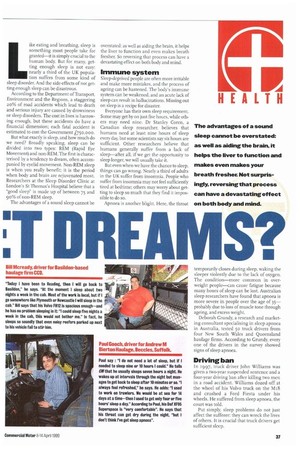L ike eating and breathing, sleep is something most people take
Page 39

If you've noticed an error in this article please click here to report it so we can fix it.
for granted—it is simply crucial to the human body. But for many, getting enough sleep is not easy: nearly a third of the UK population suffers from some kind of sleep disorder. And the side-effects of not getting enough sleep can be disastrous.
According to the Department of Transport, Environment and the Regions, a staggering zo% of road accidents which lead to death and serious injury are caused by drowsiness or sleep disorders. The cost in lives is harrowing enough, but these accidents do have a financial dimension; each fatal accident is estimated to cost the Government £750,000.
But what exactly is sleep, and how much do we need? Broadly speaking, sleep can be divided in io two types: REM (Rapid Eye Movement) arid non-REM. The first is characterised by a tendency to dream, often accompanied by eyelid movement. Non-REM sleep is when you really benefit; it is the period when body and brain are rejuvenated most. Researchers at the Sleep Disorder Clinic at London's St Thomas's Hospital believe that a "good sleep" is made up of between 75 and 90% of non-REM sleep.
The advantages of a sound sleep cannot be overstated: as well as aiding the brain, it helps the liver to function and even makes breath fresher. So reversing that process can have a devastating effect on both body and mind.
Immune system
Sleep-deprived people are often more irritable and make more mistakes, and the process of ageing can be hastened. The body's immune system can be weakened, and an acute lack of sleep can result in hallucinations. Missing out on sleep is a recipe for disaster.
Everyone has their own sleep requirement. Some may get by on just five hours, while others may need nine. Dr Stanley Coren, a Canadian sleep researcher, believes that humans need at least nine hours of sleep every day, but some scientists say six hours are sufficient. Other researchers believe that humans generally suffer from a lack of sleep—after all, if we get the opportunity to sleep longer, we will usually take it.
But even when we have the chance to sleep, things can go wrong. Nearly a third of adults in the UK suffer from insomnia. People who suffer from insomnia may not feel sufficiently tired at bedtime; others may worry about getting to sleep so much that they find it impossible to do so.
Apnoea is another blight. Here, the throat




































































































